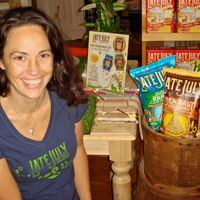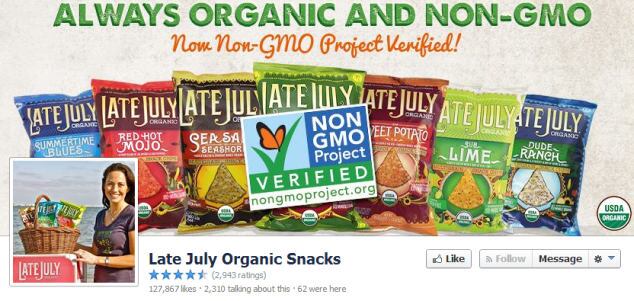Back in 2003, when she formed the company, however, Dawes’ focus was on crackers, something she had been craving while pregnant with her son in New York.
“There were organic snacks out there, but I couldn’t find any organic ones, so I started working on recipes,” she told FoodNavigator-USA. “With hindsight, it was probably the worst possible time to start a business. I spent my entire pregnancy perfecting the concept.”
Even today, so many products are flat out disappointing
Dawes knew a thing or two about the snacks market (her father Stephen Bernard founded Cape Cod Potato Chips), and the natural foods channel (her mother ran a natural food store in Cape Cod in the late 70s), but not much about crackers.
“There’s a lot of science around making the perfect cracker,” said Dawes. “And to make them properly, you need an industrial size cracker oven. I was determined to make something delicious without trans fats, artificial flavors and colors, and it had to be certified organic.
“I’d grown up with the products from Mom’s natural food store and at that time, natural snacks had a pretty bad reputation. And even today, so many products are flat out disappointing.”
The name Late July meanwhile, was about capturing a “perfect moment in time”, added Dawes, whose birthday is at the end of July. “It’s just a magical time when you’re knee-deep in summer.”
After finding a manufacturer to produce her crackers, Dawes launched her brand at Expo East in 2003, and it quickly became clear that she had come up with a winning formula.

“We were very lucky to be successful out of the gate. I don’t think I’ll ever experience a trade show quite like that again. I found a broker and a distributor, but the key thing was talking to retailers directly.”
We’ve tripled the size of the business in three years
However, the Barnstable, MA-based business really took off in 2010, when Dawes moved into organic, gluten-free, 100% wholegrain tortilla snack chips packed with nutrient-rich seeds and grains such as chia, amaranth, flax, quinoa and millet.
The chips - which scooped a new products showcase award at the 2010 Natural Products Expo East trade show that year - were an instant hit, said Dawes: “The brand just exploded in 2010. In 2011, we had 70% growth.
“Today chips account for close to 80% of our sales and we’re in every major retailer in the US in some capacity. This year we're at a run rate of $60m - we’ve tripled the size of the business in three years.
“We’ve just been really fortunate that our brand has resonated with consumers across all channels; Late July is the fastest growing brand in tortilla chips right now."
But there is no room for complacency, stressed Dawes, who is up against some strong - and well-financed - competitors in the healthier snacks section from Food Should Taste Good (General Mills) to Garden of Eatin (Hain Celestial), although the organic stamp still gives her a distinct point of difference.
“Retailers must offer at least one certified organic brand in any given category," she added, "But you can’t take your eyes off the ball for one minute. You’ve got to prove yourself every single day in the snacks aisle. But you’ve also got to focus on your own game.”
I don’t blame consumers for being confused about ‘natural’ vs ‘organic’
So what does she make of the recent campaign backed by organic firms such as Stonyfield Farm and Annie's to remind consumers that ‘organic’ means something concrete, whereas ‘natural’ is rather more nebulous (click here)?
Said Dawes: “I don’t blame consumers for being confused. Having spent all this time in the organic industry, I’m disappointed we haven’t progressed further to the point where consumers aren’t confused [about the distinction between certified organic foods, which are underpinned by strict standards; and ‘all-natural’ foods, which are not].”
“The organic food industry has done a bad job of educating people about what organic really means.”
Meanwhile, despite the ongoing threat of litigation, food marketers are continuing to deploy woolly phrases such as ‘all-natural’ to sell snack products that are in many cases “no different from regular snacks”, she noted. However, she is also clear that being organic is not in itself a guarantee that a product is healthy.
“We feel we have an obligation to make our products healthy. For example, we no longer make cookies. We wanted to do more to make products healthy not just healthier. So aside from being USDA certified organic, we’re also 100% whole grain, we try to keep fat and sodium levels down and we have zero trans fat.”
Non-GMO Project certification
A recent initiative has been the move to get all of Late July’s products certified by the Non-GMO Project.
Asked why she felt the need to do this given that USDA National Organic Program (NOP) identifies genetic modification as an excluded method, Dawes said: “We did it to remove any confusion. Some people still don’t realize that the organic logo means they are non-GMO.”
Late July is exhibiting at Natural Products Expo West in Anaheim this week at booth #2334.

